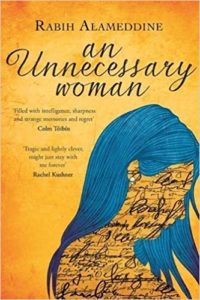Book review: An Unnecessary Woman by Rabih Alameddine
 A very long time ago (17/18 years, to be less vague) I used to regularly browse the sales boxes at Blackwell Bookshop in Oxford. I had recently graduated, was working in my first publishing job, and was reading everything I could. I bought books in large quantities, anything that caught my eye, and in that way discovered some amazing authors (and of course some duds). One of my discoveries was a book called I, the Divine by Rabih Alameddine, the Lebanese author’s second novel. It’s an experimental novel, written in the form of a series of first chapters, and I loved it. Then I completely failed to follow up and buy any more of his books.
A very long time ago (17/18 years, to be less vague) I used to regularly browse the sales boxes at Blackwell Bookshop in Oxford. I had recently graduated, was working in my first publishing job, and was reading everything I could. I bought books in large quantities, anything that caught my eye, and in that way discovered some amazing authors (and of course some duds). One of my discoveries was a book called I, the Divine by Rabih Alameddine, the Lebanese author’s second novel. It’s an experimental novel, written in the form of a series of first chapters, and I loved it. Then I completely failed to follow up and buy any more of his books.
Skip a decade or so and I discovered Alameddine’s Twitter stream, a delightful collection of artworks and poetry curated by someone I share taste and a sense of humour with. (Seriously, these days his Twitter is one of the few good reasons to keep bothering with that particular arm of social media.) Last year I finally bought another of his books, the novel An Unnecessary Woman, and over the Christmas break I read it.
The “unnecessary woman” of the title is Aaliya. She has lived alone in her Beirut apartment since the end of her brief marriage decades ago. She is not on good terms with her family, who resent her independence (and the reasonably nice flat she was able to keep when her husband left). Every year she translates a book into Arabic, starting her new project each 1 January. Appropriately enough for when I picked this up, the book is set over the end of one year and the start of the next, as Aaliya is musing on her next project.
“I’d read the Quran and memorized large chunks of it, but all that studying didn’t introduce me to the language’s magic – forced learning and magic are congenital adversaries…The teacher frightened faith out of my soul. I didn’t care that the Quran had dozens of words for various bodies of water, that it used rhythms and rhymes that hadn’t been heard before.”
Aaliya’s narration is packed with wordplay and literary references, but it gradually becomes clear that this is masking what she really thinks about constantly: solitude and ageing. She is funny, intelligent, sympathetic, so when the meandering musing finally breaks into some actual events, I was thoroughly on her side. Which is for the best as her interactions with other people, from her neighbours to her mother, are brittle.
Aaliya thinks about the past a lot – her past, that is. She thinks about living through war, she thinks about the one true friend she ever had. There are some melancholic and bleak moments in this novel, but overall it’s more hopeful than might be expected.
“To believe that words will in any way mirror or, alas, explain the infinite mystery of sex is akin to believing that reading dark notes on paper can illuminate a Bach partita…Sex, like art, can unsettle a soul, can grind a heart in a mortar. Sex, like literature, can sneak the other within one’s walls, even if only for a moment.”
I already have another of Alameddine’s novels on my TBR, so there (hopefully) won’t be another 17-year gap before I read him again.
Published 2014 by Grove Press.
Source: Stanfords Bookshop, Bristol.